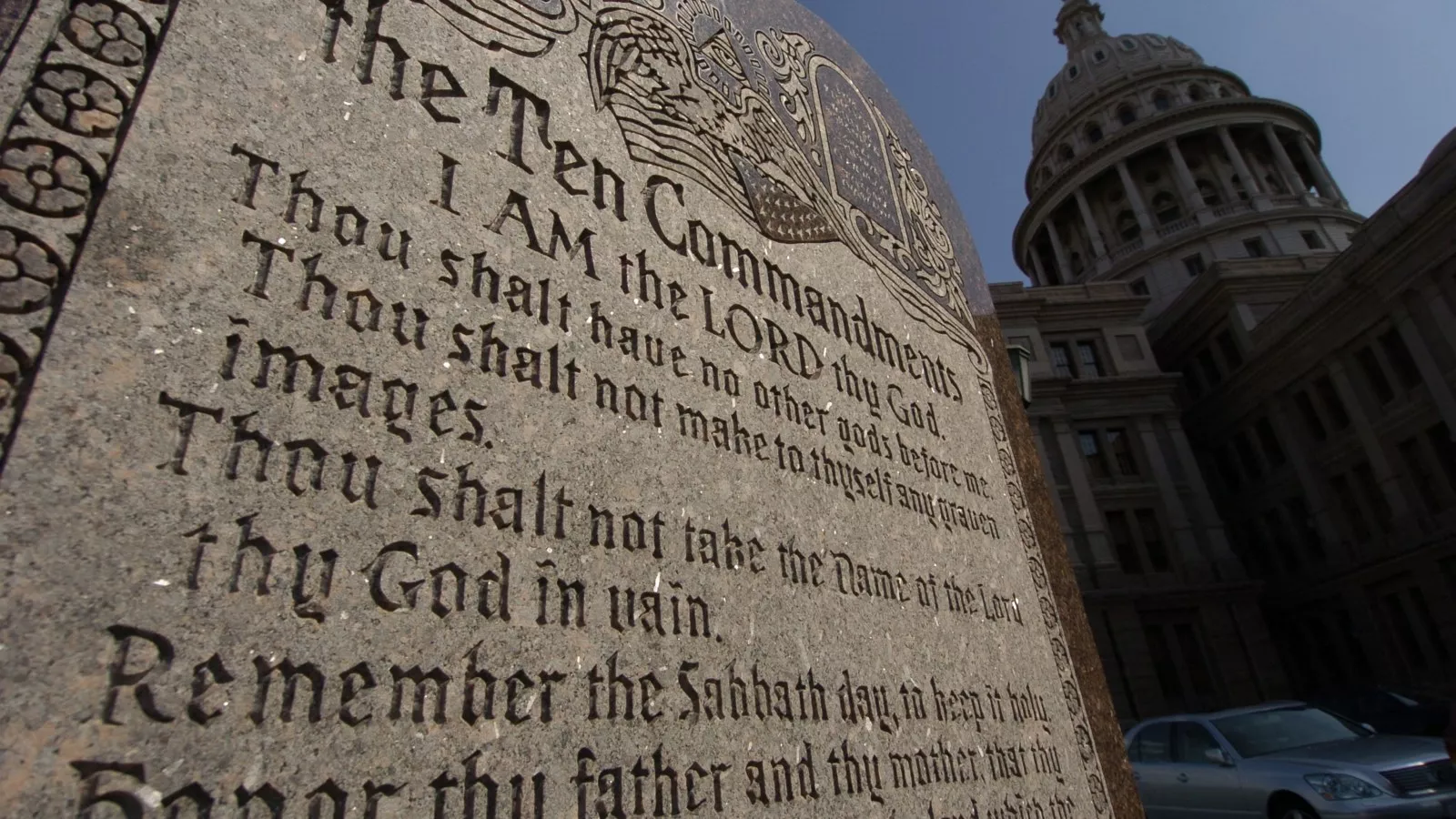CBS News reports, "Louisiana has become the first state to require that the Ten Commandments be displayed in every public school classroom, the latest move from a GOP-dominated Legislature pushing a conservative agenda under a new governor."
The legislation that Republican Gov. Jeff Landry signed into law on Wednesday requires a poster-sized display of the Ten Commandments in "large, easily readable font" in all public classrooms, from kindergarten to state-funded universities.
The enemies of God are lining up with lawyers standing by to sue the state.
Be informed, not misled.
Opponents questioned the law's constitutionality and vowed to challenge it in court. Proponents said the measure is not solely religious but has historical significance. In the law's language, the Ten Commandments are "foundational documents of our state and national government."
The posters, which will be paired with a four-paragraph "context statement" describing how the Ten Commandments "were a prominent part of American public education for almost three centuries," must be in place in classrooms by the start of 2025.
Under the law, state funds will not be used to implement the mandate. The posters would be paid for through donations.
Louisiana has become the first state to require that the Ten Commandments be displayed in every public school classroom. This is the latest move from a GOP-dominated Legislature pushing a conservative agenda under a new governor.
The law also "authorizes" but does not require the display of other items in K-12 public schools, including The Mayflower Compact, which was signed by religious pilgrims aboard the Mayflower in 1620 and is often referred to as America's "First Constitution"; the Declaration of Independence; and the Northwest Ordinance, which established a government in the Northwest Territory - in the present day Midwest - and created a pathway for admitting new states to the Union.
It's interesting that CBS notes that the Mayflower Compact was signed by "religious pilgrims."
There are no founding documents in America's history that were not "signed" by at least some Christians because most of our Founding Fathers were Christians.
Is that now the new standard for rejecting historical documents?
Louisiana is the first state to successfully pass legislation requiring the display of the Ten Commandments in public school classrooms, including state-funded universities, since the Supreme Court voted 5-4 to banish the tenets from America’s classrooms in 1980. Efforts to restore the commandments to public schools are active in other states, including Texas, Oklahoma, and Utah, although none so far have been successful.
How will this be funded?
However, the displays must be visible in the classroom by January 1, 2025.
“I’m going to organize an effort, and we will fund it,” Dean Young told Breitbart News on Wednesday ahead of the bill’s signing. Young is a Christian activist who has worked for 30 years to restore the Ten Commandments to classrooms across the United States.
“There will be a Ten Commandments for every single classroom in Louisiana, at LSU, at every college — and it will be funded,” Young continued.
He's right. He'll have no problem raising money to put the Ten Commandments in classrooms.
Does this bill have a chance to survive the lawsuits?
CBS ponders the notion that the Commandments in the room might cause some to feel "unsafe."
The bill wisely points to more recent decisions by the Supreme Court finding that the Ten Commandments “have historical significance as one of the foundations of our legal system” and represent a “common cultural heritage.” The bill further states that “Recognizing the historical role of the Ten Commandments accords with our nation’s history and faithfully reflects the understanding of the founders of our nation with respect to the necessity of civil morality to a function self-government.”
"It is meant to impose Christianity on all students in Louisiana’s public schools, even if they belong to a minority religion or no religion at all,” according to The Center for Inquiry’s director of government affairs, Azhar Majeed, wrote a letter to the Governor.
You will remember the Supreme Court decided in favor of the former Bremerton High School football coach who was fired for praying on the field. In that decision, the Supreme Court ruled that Coach Joe Kennedy’s silent prayers on the field after games did not violate the Establishment Clause of the First Amendment.
The Supreme Court also struck down the “Lemon test,” which was used in the Supreme Court’s 1980 Stone v. Graham decision to overturn a Kentucky law similar to the new one in Louisiana. The Lemon test was a measure of government coercion of religion that some justices had previously called outdated and misused.
Focus on the Family’s Nicole Hunt wondered in an op-ed for Newsweek: “Now, with the Lemon test officially rejected, it’s fair to ask whether, under this alternative test based on ‘historical practices and understandings,’ a state could require a culturally and historically significant document, like the Ten Commandments, to be posted in public school classrooms.”
She added:
Some opponents of the Louisiana legislation argue that it violates the separation of church and state. This is a specious claim—” separation of church and state” is never even mentioned in the U.S. Constitution.
The phrase comes from a letter Thomas Jefferson wrote to a Baptist church association. The association expressed concern about being targeted by the government for persecution because it was a religious minority. Jefferson used the phrase “separation of church and state” in an attempt to assure people of faith that the Constitution would protect their religious liberty from government discrimination.
Ironically, Jefferson’s words have since been used by individuals who seek to exclude religion from the public square to discriminate against people of faith.
Takeaway
One lawmaker said, "Until 1980, the Ten Commandments were in all the schools, and this state leadership realizes that all of this garbage that they’re teaching these children about — if you don’t have a moral foundation, you get what we’re getting today. If there’s not right and wrong, and it’s just everybody’s opinion, then this is what happens: your society falls apart."
He said, “They realize we have to get back to what this nation was founded on, and this nation was founded on a belief in God.”
After the bill passed, the Governor said while giving a speech in Nashville, "I’m going home to sign a bill that places the Ten Commandments in public classrooms. And I can’t wait to be sued.”
Be Informed. Be Discerning. Be Vigilant. Be Engaged. Be Bold. Be Prayerful.



